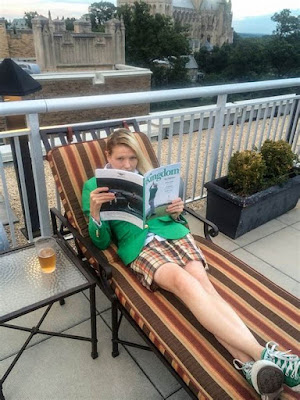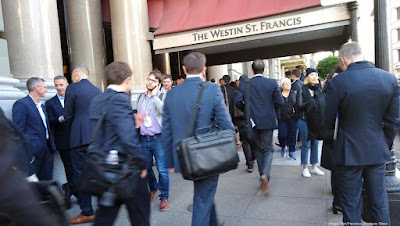In business school I took a course called “Marketing High-Tech Products.” We studied Empire of the Air, the Ken Burns film, which documented how American culture was shaped by radio, and how a few extraordinary, ambitious, often troubled men were the force behind its emergence. Highly intelligent misfits like Edwin Howard Armstrong, who discovered that audio signals could be represented by modulating the frequency of a carrier wave, thus inventing FM radio. Alongside his scientific prowess, Armstrong had an odd fascination with climbing to the top of antennae towers – a hobby made more poignant when, one winter’s night in 1954, he exited a window in his apartment on East 52nd Street and dropped 13 floors to his death.
One of the lessons of that class was that the better technology – in this case FM, far superior to AM as far as sound quality and broadcast range – sometimes isn’t the one that wins in the market. Technical, commercial, and most of all human factors often conspire to promote inferior platforms. Armstrong’s long-standing feud with David Sarnoff, the President of RCA and a key figure behind the dominance of AM radio at the time, was believed to have contributed to his suicide.
The other lesson was how radio transformed electrified human communication from one-to-one (e.g., a telephone or telegram) to one-to-all. “For the first time in history,” said Jason Robards in the film’s voice-over, “one person with a microphone could speak to many, influence them, perhaps change their lives.” Television would take this even further, introducing visuals into the equation.
I took this class in 2005, as “Web 2.0” was just getting off the ground and people were gushing about “user-generated content.” “The Facebook” had launched the year before, but “social media” as a term and a concept hadn’t yet taken hold of American culture. The first iPhone wouldn’t come out for a couple more years. Still, in class that day, there was excitement around how this evolution was about to reach its pinnacle: an age in which technology would enable all-to-all communication. Thanks to these platforms, everyone would be able to engage with everyone. Mass communication would be democratized. Information would be fully transparent and accessible. Human relationships would strengthen. The world would be a better place.
Not so much, it turns out. By pretty much any measure, social media – turbocharged by ubiquitous smart phones, capital markets, and another small cohort of highly intelligent yet flawed young men – has generated far more harm than good. It has increased depression, anxiety, body-dissatisfaction, and insomnia, especially among young people. It has enabled the rise of surveillance capitalism, which has moved swiftly beyond advertising efficiencies into the realm of social control and economic oppression. It has played an active role in real-world violence. It has encouraged humans to communicate in ways that are performative, impersonal, knee-jerk reactive, and hostile. It has eroded human relationships and the essential societal foundation of common truths.
I figure you know all this already. The question is what are we supposed to do now?
A few years ago, my father was cleaning out his basement, and he asked me to come pick up some of my old boxes. Inside one of them, I stumbled across a pile of letters I had received when I was in college. Sifting through them, I was amazed to find more than 200 letters and cards: from my closest friends, but also from people I wasn’t that close to; from my parents and grandparents and aunts; from former coaches; from old flames and would-be lovers; from people I hadn’t thought about for 35 years, but to whom at some point I had gone through the trouble of writing.
Many of these letters were mundane, but a surprising number were interesting and thoughtful and real. They were asynchronous, they were thought through and mulled over, sometimes they were agonizingly waited for and torn open with anticipation. At the time, this was one of the primary ways we formed, maintained, strengthened (and in some cases severed) human relationships. For a while, email took up this mantle, and group chats still help keep a lot of people connected in a positive way. But I can’t remember the last time I sent someone a truly thoughtful or important email.
Is it silly to think we could start writing letters again? Does it take too much time and effort? Is it too much of a hassle to find a stamp and schlep to the post office?
I would like to find out at least. I’ve made a list of 52 people, and I will write at least one letter per week for the next year. If you wouldn’t mind getting a letter from me, please send me your mailing address. (If I already have your address, and/or if your last name is “Snow,” you’re already on the hook.) Of course you’re welcome to write me back, but please don’t feel obligated to. If this inspires you to write to someone else, even better.
This may seem no more than a quaint exercise in nostalgia, and I’m not naïve enough to believe that mailing a few letters will inspire a magical awakening of goodwill and kinship and The Soul of America Will Be Saved. But consider for a moment the fact that the United States Postal Service is in real danger of being dismantled by profiteers who would like to arrange things so that your interactions with other humans are mediated only by them. Imagine for a moment that x.com were the only means of communicating with faraway family members, or accessing your medical records, or filing your taxes, or voting. While I still can, I will write some letters, because I suspect it beats doomscrolling. And I’m sure it beats doing nothing.

















